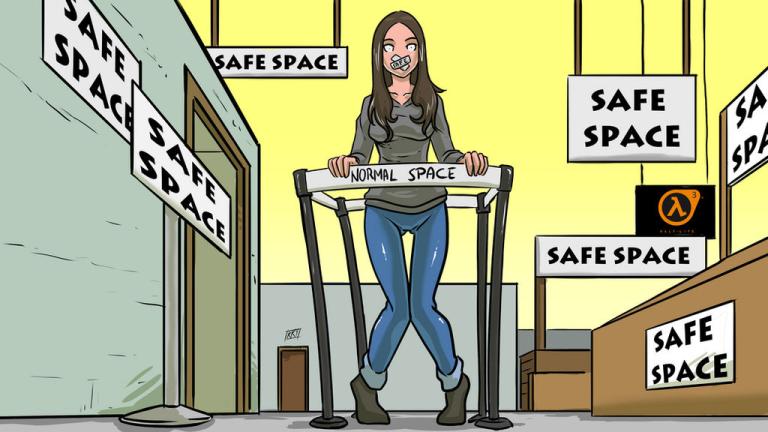“Safe spaces” permeate various sectors of society, including educational institutions, workplaces, and religious communities. The concept was initially meant to provide marginalized groups with a place of refuge and expression without fear of discrimination or harassment.
However, this well-meaning idea has repercussions on dialogue, community cohesion, and the quest for truth. Unfortunately, too many Christians have uncritically embraced the concept of “safe spaces.”

This post explores how “safe spaces” inadvertently detract from genuine community rather than enhance the safety (to say nothing of flourishing) it aims to provide. By cultivating environments that stifle challenging discussions and the pursuit of clarity, “safe spaces” paradoxically inhibit growth, trust, humility, mutual understanding, and the love of truth.
1. The Essence of Genuine Community
Biblical Christianity is deeply committed to authentic community, marked by a culture of openness, mutual respect, and a courageous exchange of ideas. Churches ought to be fertile ground for individuals to delve into, question, and refine their beliefs in submission to Scripture and in dialogue with fellow believers.
The New Testament church vividly exemplifies a community model where correction, encouragement, and growth occur in harmony (Hebrews 10:24-25; Galatians 6:1). The introduction of “safe spaces,” despite its protective intentions, frequently muffles the type of dialogue essential for authentic faith to take root and grow.
2. Uncontested Ideas
Many evangelicals have a significant concern–– that unchallenged ideas will flourish unchecked. Proverbs 27:17 says, “Iron sharpens iron, and one man sharpens another.” Scripture emphasizes the importance of mutual sharpening. The metaphor itself points to a vigorous exchange and scrutiny of ideas that culminate in improved understanding and wisdom.
Retreating into environments that silence dissent or exclude contrary perspectives poses a grave risk.
It fosters an insular mindset, resistant to external critique and oblivious to inherent biases. Such conditions are starkly at odds with the evangelical dedication to truth-seeking, which inherently involves grappling with challenging perspectives and reevaluating beliefs in light of Scripture and reasoned conversation.
3. The Mirage of Safety
The perceived safety within “safe spaces” is a mirage. It’s built on the absence of threats to one’s ideas or identity. However, this form of safety overlooks the deeper, existential, and spiritual safety that the transformative power of the gospel offers.
The gospel invites believers to face uncomfortable truths about themselves and the world, a journey that is unsettling but ultimately freeing (John 8:32). By favoring a superficial sense of security over the rigors of growth, “safe spaces” risk impeding us from encountering the more enduring safety found in Christ, which surpasses external validations and challenges.
4. Eroding Community and Dialogue
Genuine dialogue is characterized by respectful idea exchange. It is crucial for any community, especially those rooted in the pursuit of truth. “Safe spaces,” by their very design, seek to shield individuals from speech or ideas considered harmful.
While protection from abuse and harassment is vital, the wide application of this concept suppresses legitimate discourse on contentious topics. This suppression not only impoverishes the church’s apprehension and appreciation of truth, but it also cultivates a culture of avoidance rather than confrontation. By contrast, a biblical community embraces tough conversations as avenues for growth in character and deepening relational bonds.
5. The Challenge of a Pluralistic Society
Believers are called to engage thoughtfully and compassionately with the surrounding culture. The retreat into “safe spaces” provides an incomplete framework for such engagement, hindering Christ’s people from effectively fulfilling their mission to make disciples of all nations (Matthew 28:19). Creating environments that deem the engagement with external challenging ideas as unsafe undermines our mission to engage meaningfully with the world.
Toward Truly Safe Communities
The conventional model of “safe spaces” does not align well with Christian commitments to truth-seeking, authentic dialogue, and genuine community.
Instead of erecting barriers against challenge and discomfort, we should cultivate churches and communities that offer a deeper form of safety: places where individuals are free to explore, question, and grow in their understanding of the gospel and its life implications.
These communities emphasize love, respect, and mutual edification, rooted in the belief that true safety is not in the avoidance of conflict but in the presence of Christ. He leads his followers into all truth. Truth is a place of safety and life.













